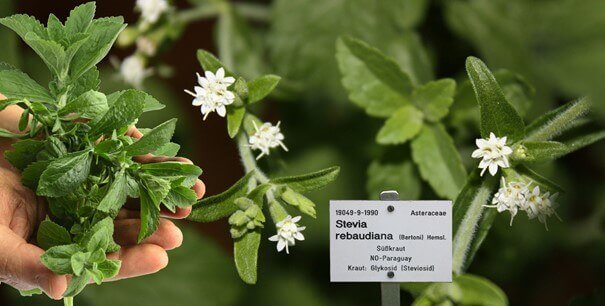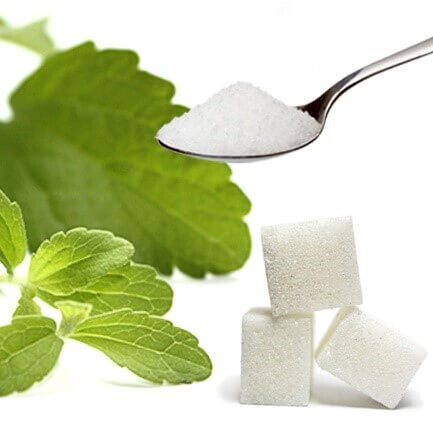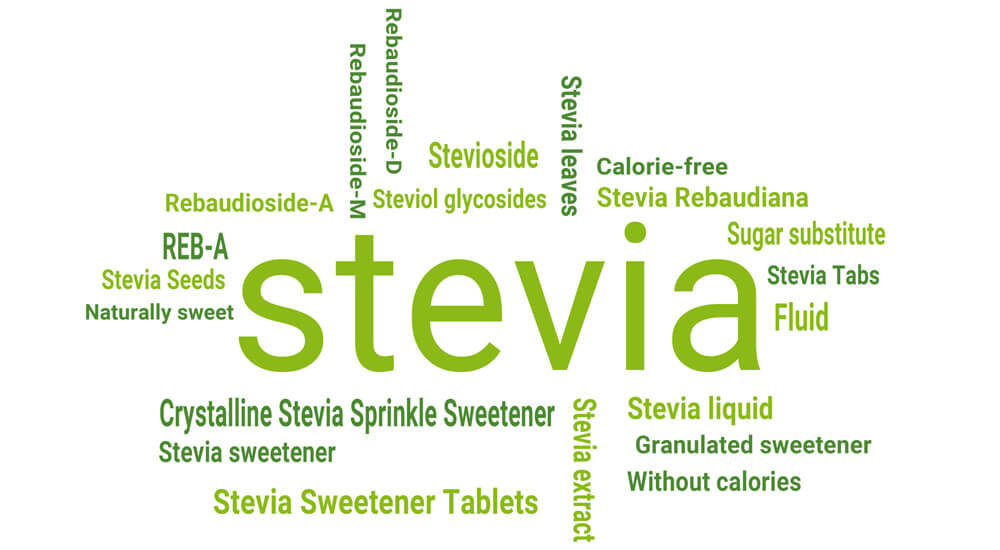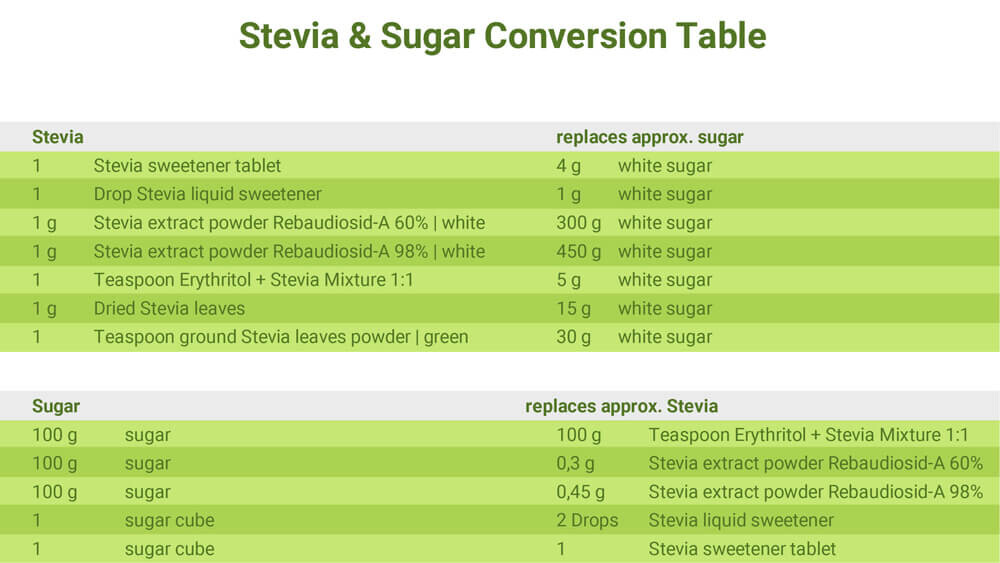Questions and answers about Stevia | Stevia FAQ
Frequently asked questions about Stevia: our FAQs answer the most frequently asked questions and provide you with answers. Learn everything you need to know about Stevia.
To make your purchase decision easier, we address the different questions regarding the benefits and usability.
How can you replace sugar with Stevia?
Why can Stevia taste bitter?
Why are there such big differences in the price of Stevia?
We also give you tips for various Stevia products.
If you still have questions, please contact us.
We will be happy to help you.
Frequently asked questions about Stevia
Stevia is a natural sweetener alternative derived from the leaves of the Stevia plant.
It has high sweetening power and contains no calories, making it a popular option for people who want to reduce their sugar intake.
Stevia is often used as a tablet sweetener and is also found in many processed foods and beverages as an ingredient or natural sweetener.
It is known for its intense sweetness compared to conventional sugar, so only a small amount of Stevia is needed to achieve the same sweetness.
Yes, diabetics may use Steviol glycosides. Steviol glycosides are the main components of Stevia and have no significant effect on blood sugar levels. They contain no carbohydrates or calories, making them a suitable alternative for diabetics. Studies have shown that Steviol glycosides do not affect insulin levels and do not increase blood sugar.
Therefore, diabetics can use Steviol glycosides as a sweetener in their diet to reduce sugar consumption and improve blood sugar control. However, it is recommended to talk to a doctor or dietician to make individual recommendations and adjustments.
The price differences of Stevia can have several reasons. Firstly, the price depends on the type of Stevia product, such as pure Stevia powder, liquid sweetener or sweetener tablets. Secondly, the quality of the Stevia extract has a big impact on the price.
High-quality Stevia products that have higher purity and concentration are more expensive. Supply and demand can influence the price. If the demand for Stevia increases, this can lead to higher prices.Stevia is often considered a healthier alternative to sugar because it contains no calories. It can help reduce sugar consumption and keep blood sugar levels stable.
Compared to sugar, Stevia has a much higher sweetening power, which means that only a smaller amount is needed. However, there continues to be debate and research on the potential health effects of Stevia, especially in terms of long-term effects or possible effects on metabolism. As with everything, Stevia and sugar should be consumed in moderation and individual health needs should be considered.
Stevia, as part of a healthy diet, can help reduce sugar consumption and thus contribute to weight loss. By replacing sugar with Stevia, calorie intake can be reduced. As Stevia is calorie-free, it does not directly contribute to weight gain.
However, it is important to note that weight loss depends on many factors and a balanced diet and regular physical activity are equally important. Stevia alone cannot work miracles, but should be considered as part of an overall healthy lifestyle.
The amount of Stevia needed to replace sugar can vary greatly depending on the brand and purity of the Stevia product. In general, it can be said that 1 teaspoon of Stevia powder has about the sweetening power of 1 cup of sugar. However, it is important to follow the manufacturer's specific instructions as the concentration and sweetness of Stevia products can vary.
Stevia products often have a higher sweetening power and are used in very small amounts relative to sugar. It is recommended to start with small amounts and adjust according to personal taste.
When losing weight, it is advisable to reduce the overall consumption of sweeteners. However, if a sweetener alternative is desired, calorie-free options such as Stevia, Erythritol or sucralose can be used.
These sweeteners contain no or few calories and have little effect on blood sugar levels. It is important to consider individual tolerance and any effects on appetite. A balanced diet, regular physical activity and moderate calorie intake are crucial for successful weight loss.
When losing weight, it is advisable to reduce total sugar consumption, regardless of the type of sugar. However, there are some sugar alternatives that can be considered lighter options. Coconut blossom sugar, agave syrup or maple syrup are sometimes considered more 'natural' sugar alternatives. However, they still contain calories and should be used in moderation.
Ultimately, it is important to control total calorie intake and prioritise a balanced diet of nutrient-rich foods to be successful in losing weight.
The choice between Erythritol and Stevia depends on personal preferences and needs. Erythritol is a calorie-free sugar alcohol that tastes and has a similar texture to sugar. Stevia, on the other hand, is a calorie-free sweetener made from plant extracts that has a more intense sweetening power.
Erythritol has no known effect on blood sugar levels, while Stevia has no effect on insulin levels. The choice between the two depends on individual taste preferences, tolerance and intended uses.
No, sugar cannot be replaced 1 to 1 by Stevia. Stevia is much sweeter than sugar and therefore requires a smaller amount to achieve the same sweetening power. A general rule of thumb is that about 1 teaspoon of Stevia powder is roughly equivalent to the sweetening power of 1 cup of sugar. It is important to follow the specific instructions of the Stevia product as the concentration and sweetening power may vary depending on the brand and product.
It is advisable to start with a smaller amount of Stevia and adjust according to personal taste to achieve the desired sweetening level.
Yes, Stevia has fewer calories than sugar. While 1 teaspoon of sugar contains about 16 calories, Stevia usually has no or negligible calories. Stevia consists mainly of Steviol glycosides, which are calorie-free and not metabolised by the body.
Replacing sugar with Stevia can reduce calorie intake, which can be beneficial when following a calorie-conscious diet or losing weight. However, it is important to note that other ingredients in a recipe or food preparation may also contribute to the total calories.
No, Erythritol and Stevia are not the same. Erythritol is a sugar alcohol that occurs naturally in certain fruits and fermented foods. It has a similar structure and sweetening power of 60% to sugar and contains no calories.
Stevia, on the other hand, is a natural sweetener extracted from the leaves of the Stevia plant. It consists mainly of Steviol glycosides, which have a much higher sweetening power than sugar and are calorie-free. However, Erythritol and Stevia can be used in combination to improve sweetness and texture in recipes.
Yes, it is possible to use Stevia instead of Erythritol, but it can lead to differences in taste and texture. Erythritol has a similar texture and sweetening power to sugar, while Stevia has a more intense sweetening power. As Stevia is usually used in much smaller quantities, this can result in a different consistency.
It is important to follow the specific instructions in recipes and make adjustments if necessary to achieve the desired result. It can also be helpful to use Erythritol and Stevia in combination to balance the sweetness and texture and is also very easy to dose.
There are several ways to replace sugar in baking. One option is to use substitutes such as Erythritol, Stevia, xylitol or coconut blossom sugar, which have a similar sweetening power to sugar. These can usually be used in a 1:1 ratio to sugar, but you may need to adjust the amount of liquid in the recipe. Alternatively, you can use fruit purees such as applesauce or bananas to add sweetness and moisture.
Another approach is to use spices such as cinnamon, vanilla or cardamom to intensify the flavour without adding extra sweetness. Experiment and adjust the amount of sweetener to your personal taste.
Evaluating the best Stevia depends on personal preferences and needs. There are several brands and products on the market that offer Stevia. It is advisable to look for high-quality Stevia products that do not contain additional fillers or chemical additives. In addition, the form of Stevia, such as powder, liquid or tablets, may vary depending on the intended use.
It is also helpful to consider customer reviews and recommendations from other consumers to find the best Stevia for yourself. Ultimately, it is important to try different options and choose the Stevia that best suits your tastes and requirements.
Yes, Stevia is sugar-free. Stevia is extracted from the leaves of the Stevia plant and naturally contains no sugar components. It consists mainly of Steviol glycosides, which are responsible for the sweetening power. Stevia has a negligible effect on blood sugar levels and generally contains no or very few calories.
It is a popular alternative to conventional sugar for people who want to reduce their sugar consumption. However, it is important to check labels as some Stevia products may be mixed or sweetened with other ingredients.
Stevia naturally contains no sugar. It consists mainly of Steviol glycosides, which are calorie-free and do not affect blood sugar levels. Stevia has a much higher sweetening power than sugar, so only a small amount is needed to achieve the same sweetness.
However, Stevia products on the market may contain additional ingredients that may also contain amounts of sugar. Therefore, it is important to check the product labels to ensure that the Stevia product you choose is sugar-free.
There are three main differences to consider when buying Stevia: Taste, yield and sweetness. A high-quality Stevia product is characterised by high sweetening power and leaves hardly any aftertaste. If you have not enjoyed Stevia in the past, it is most likely because you have purchased an inferior product. Many Stevia sweetener products in the supermarket contain only a small amount of Steviol glycosides (Stevia) and often flavours and maltodextrin or sucralose. These products therefore have little to do with "Stevia".
These two features characterise a high-quality Stevia extract:
- Degree of purity:
- Rebaudioside-A (Reb-A) content:
The Rebaudioside-A content should be at least 60% - 98%, depending on the product. Rebaudioside-A, also known as "Reb-A", is the sweetest and non-bitter component of the Stevia plant.
When these criteria are met, the taste of Stevia approaches that of sugar. Many of the products currently available on the market, such as sticks, tabs or crystalline powder, contain only small amounts of Stevia. The amount of Rebaudioside-A (Reb-A) is also often very low. But where can you buy good Stevia?
At this point, we recommend a product that fully meets these criteria.
Stevia can be bought in various forms and brands in supermarkets, health food shops and online shops. Look for high-quality Stevia products without additives. You can buy Stevia as powder, liquid or tablets, depending on your preferences and uses.
Before buying, it is advisable to compare the products.
Read the product descriptions to make the best choice. Compare prices and qualities to find the right Stevia product for your needs.
The main difference between sugar and Stevia lies in their composition and sweetness. Sugar, like white household sugar, consists of sucrose and contains calories.
Stevia, on the other hand, consists mainly of Steviol glycosides and is calorie-free. Stevia has a much higher sweetening power than sugar, so only a smaller amount is needed to achieve the same sweetness. Stevia does not affect blood sugar levels, whereas sugar can increase blood sugar levels.
The taste of Stevia can be described as sweet to slightly tart depending on the level of quality of the Stevia used. Some people find the taste pleasant and similar to sugar, while others may perceive a slightly bitter aftertaste.
Taste perception can vary from person to person. Using good quality Stevia and the right dosage can help to achieve a pleasant taste. It may also depend on whether you choose Stevia powder, liquid or tablets. It is advisable to try different brands and products to find your personal taste.
Sugar substitute for diabetics
For diabetics, sugar alternatives that only minimally affect blood sugar levels are suitable. Examples are Erythritol, Stevia and sucralose. These sweeteners have a minor effect on blood sugar and can be part of a diabetic diet in moderate amounts.
However, it is important to consider the total carbohydrate content and the individual response to these sugar alternatives. It is best to speak with a doctor or dietitian to determine the best options for a diabetic's individual needs.
Sugar alcohols such as Erythritol and xylitol increase blood sugar levels only minimally and have a low glycaemic index. They are absorbed and metabolised more slowly by the body. Coconut blossom sugar and maple syrup also have a lower glycaemic index than conventional sugar, but can still slightly increase blood sugar levels.
Stevia, a calorie-free sweetener, has no effect on blood sugar levels as it is not metabolised. Nevertheless, it is important to consider the individual response to these sugar alternatives and consume them in moderate amounts.
Diabetic sugar or sugar-free sweeteners can be bought in many supermarkets, health food shops and online shops. Look for products that are specifically labelled for diabetics or offer sugar-free alternatives. There are several options such as Erythritol, Stevia, xylitol or sucralose that may be suitable for diabetics.
Read product descriptions and ingredients carefully to make sure they meet your needs. Compare prices, quality and customer reviews to find the right product.
Sweeteners for diabetics are available in many supermarkets, pharmacies and online shops. Look for products that are specifically suitable for diabetics or labelled as sugar-free.
There are several options such as Erythritol, Stevia, xylitol or sucralose that can be used as sweeteners for diabetics. Read product descriptions and ingredients carefully to make sure they meet your needs. Compare prices, quality and customer reviews to find the right product.
With diabetes, it is important to keep blood sugar levels stable. Therefore, low-sugar or sugar-free alternatives should be used. Sugar alcohols such as Erythritol and xylitol have a small effect on blood sugar levels and can be used as a substitute for conventional sugar.
Stevia, a calorie-free sweetener, also has no effect on blood sugar levels. Coconut blossom sugar and maple syrup have a lower glycaemic index than conventional sugar, but can still slightly increase blood sugar levels and should therefore be consumed in moderation. It is important to speak with a doctor or dietitian to determine the best options for individual diabetes needs.
For diabetics, there are several sugar substitutes that have minimal impact on blood sugar levels. Erythritol, xylitol and Stevia are popular options as they have a low impact on blood sugar levels. These sweeteners can be found in many supermarkets and online shops.
Read product descriptions and ingredients carefully to make sure they are suitable for diabetics. It is important to still consider the total carbohydrate content and use these sugar substitutes in moderation. Consult a doctor or nutritionist to determine the best options for your individual needs.
Erythritol and xylitol are both sugar alcohols and are often used as sugar-free alternatives for diabetics. Both have a low impact on blood sugar levels and provide fewer calories than conventional sugar. The main difference is in taste and tolerance.
Erythritol has a refreshing taste and can be better tolerated, especially in larger quantities. Xylitol has a slightly sweet taste and can be laxative in large quantities. It is important to consider individual tolerance and try different options if necessary.
Yes, Erythritol is suitable for diabetics. It has no significant effect on blood sugar levels and does not increase insulin levels. Erythritol is not metabolised by the body and provides few calories. It can be used as a sugar-free sweetener to reduce sugar consumption.
However, the total carbohydrate content should be considered and it is advisable to monitor the individual response to Erythritol. Consult a doctor or nutritionist to determine the best options for your specific needs.
With diabetes, it is advisable to reduce sugar consumption overall. Sugar alternatives such as Erythritol, xylitol and Stevia are popular options as they have minimal impact on blood sugar levels.
These sugars provide fewer calories than regular sugar and can be part of a diabetic diet in moderation. It is important to still be aware of the total carbohydrate content and use them in moderation. Consult a doctor or dietitian to determine the best options for your individual needs.
There are several sugar substitutes that may be suitable for diabetics. Erythritol, xylitol and Stevia are popular options as they have a low impact on blood sugar levels.
Choosing the best sugar substitute depends on personal preference, tolerance and intended uses. Erythritol has a refreshing taste and similar consistency to sugar. Xylitol has a slightly sweet taste but can be laxative in large amounts. Stevia is a calorie-free sweetener with a high sweetening power. It is advisable to try different options and consult a doctor or nutritionist if necessary to make the best choice.

 German
German Dutch
Dutch French
French Italian
Italian Portuguese
Portuguese Spanish
Spanish







